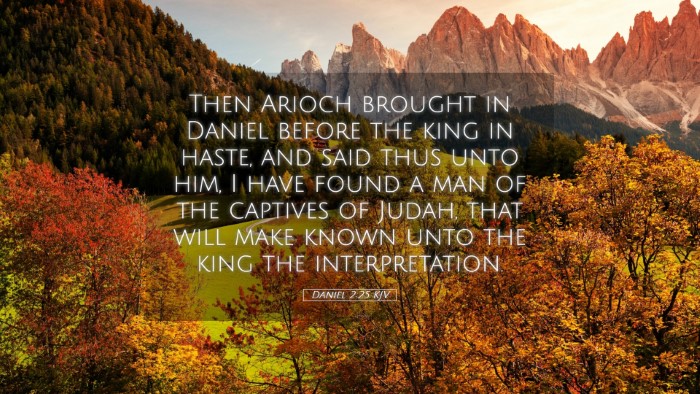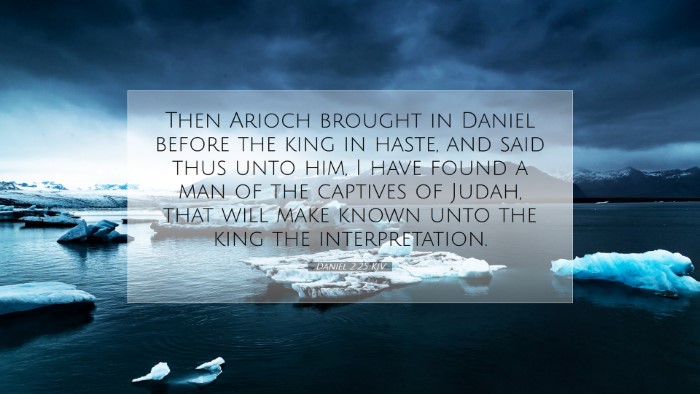Commentary on Daniel 2:25
The verse Daniel 2:25 states: "Then Arioch brought in Daniel before the king in haste, and said thus unto him, I have found a man of the captives of Judah, that will make known unto the king the interpretation." This verse is pivotal in the narrative of the Book of Daniel, reflecting not only the character of Daniel but also the profound providence of God in revealing hidden truths.
Contextual Overview
The historical context of this chapter places Daniel among the Jewish exiles in Babylon. King Nebuchadnezzar had a troubling dream that none of his wise men could interpret, resulting in a decree for their execution. Daniel, upon learning of the crisis, sought the Lord for wisdom and was later brought before the king. The hurry in which Arioch brings Daniel reflects the urgency and desperation surrounding the king's demand for interpretation.
Insights from Public Domain Commentaries
Matthew Henry
Matthew Henry emphasizes the significance of Arioch's introduction of Daniel to the king. He notes the transition from despair to hope, illustrating how the Lord can raise up a vessel for His purposes. Henry points out Arioch’s declaration ("I have found a man") as evidence of God's sovereignty in choosing Daniel for this critical moment. It conveys that wisdom and interpretation are not of human origin but gifts from God, a theme recurrent in scripture.
Albert Barnes
Albert Barnes elaborates on the role of Arioch as the king's executioner and his transformation into a bearer of good news. Barnes highlights that the phrase "I have found" indicates divine providence at work; it wasn't merely a human discovery but a divine orchestration that led to Daniel being presented to the king. Furthermore, this moment signifies the beginning of Daniel's prominence in Babylon, marking a significant shift in the narrative. Barnes underscores the nature of the king's distress and the contrasts within the chapter—between the knowledge of the magicians and the true insight given to Daniel.
Adam Clarke
Adam Clarke provides a depth of cultural insight, discussing the roles of the various groups of wise men in Babylon and their functions in interpreting dreams. He reflects on how Daniel's approach to the king is marked by both humility and reverence, in stark contrast to the pride often seen in the Chaldeans. Clarke affirms the importance of recognizing that "the captives of Judah" were used by God to fulfill His plans, highlighting the theme of God's faithfulness to His people even in the midst of exile.
Theological Implications
-
God’s Sovereignty: This verse demonstrates God's control over kingdoms and events. Daniel's presence before the king illustrates that God chose him as a mouthpiece for His revelations.
-
Human Agency: While God is sovereign, He often works through individuals like Daniel, encouraging the faithful to remain steadfast and be prepared to respond when called upon.
-
Wisdom and Revelation: The interpretation of dreams in the ancient Near East was highly regarded. Daniel's ability to interpret the dream represents the unique wisdom granted by God, distinguishing between human knowledge and divine revelation.
Practical Applications
For pastors, students, and theologians, this verse serves as a reminder of the importance of faithfulness and readiness to serve God’s purposes. Daniel’s example encourages believers to maintain a close relationship with God, seeking His wisdom and guidance in times of crisis. The urgency expressed by Arioch to present Daniel also signifies the importance of seizing divine opportunities when they arise.
Additionally, the verse calls for reflection on our response to being used by God. Are we prepared to step into our roles when called upon? Like Daniel, we should cultivate a life of prayer and dependence on God, actively seeking His interpretations of the trials we face.
Conclusion
Daniel 2:25 encapsulates a critical turning point in the narrative, showcasing the interplay of divine providence, human action, and the unfolding of God’s plan in human history. Through the insights of Henry, Barnes, and Clarke, we gain a richer understanding of the implications of this verse. As we reflect on its meaning, may we be inspired to seek God’s wisdom and readiness to act in our own lives, echoing Daniel’s faithful response to God's call.


